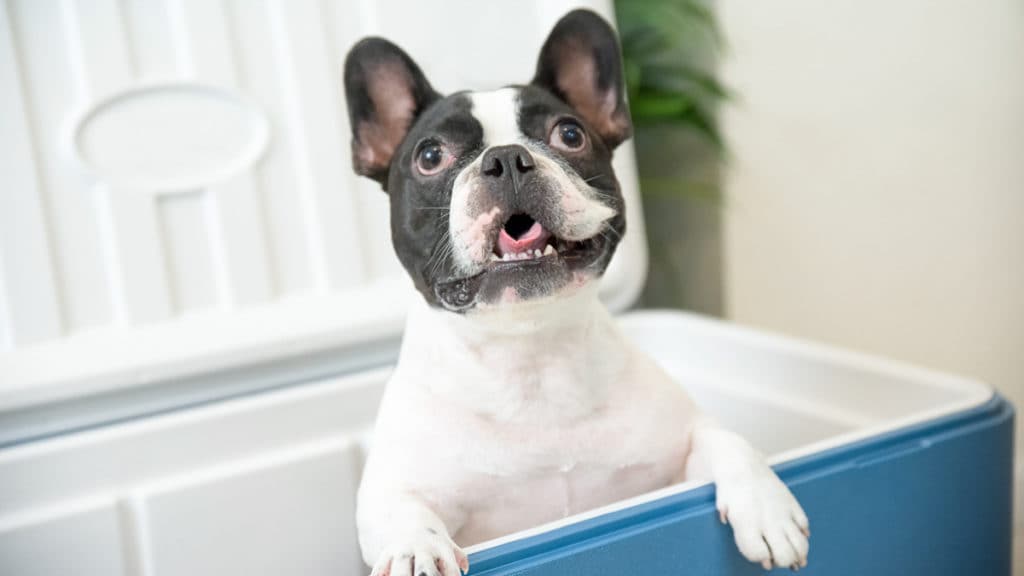Some dogs bark a little—and some dogs bark a lot! While some pups want more attention than others, nearly all dogs will bark at one point or another. So, it is no surprise that barking dog sounds are something that every dog owner is used to. Though a barking dog is a familiar sound to any dog owner, at some point you may find yourself thinking, “Why do dogs bark?” This dog behavior can have multiple meanings and is a natural instinct, but if it gets excessive, you may want to learn how to train a dog not to bark so much.
To get to the core of this unique pet behavior, we asked Dr. Taylor Truitt, DVM at The Vet Set, “Why do dogs bark?” According to Dr. Truitt, there are six primary reasons for a barking dog.
Your pup wants your attention. The first answer to the question, “Why do dogs bark?” is linked to getting your attention. Whether your dog is politely asking to be taken outside for a potty break or requesting that her bowls be refilled, she is trying to tell you something. These barking dog sounds can be a plead for playtime, or she may simply be saying, “Pay attention to me!”
When she is barking as a way of begging for attention, giving it to her will only serve as a reward and further encourage your barking dog. Though it may be difficult, Dr. Truitt recommends turning away from your dog and completely ignoring her until the negative pet behavior ceases. “Any attention, positive or negative, can be perceived as a reward for her unwanted behavior,” says Dr. Truitt, “Once the dog stops barking, then pay attention to her, and praise her for being quiet. Positive reinforcement and consistency with this method are best!” That being said, if your dog is in fact barking to let you know she needs to be taken outside or is barking at her bowl to remind you it’s dinner time, then you should take her outside or feed her. She’s not just barking for attention; she’s barking because she needs your help.
Frustration could also be the cause. Another reason that your dog may bark is because she is frustrated or bored. Whether she has been trying for hours to get a treat out of her toy, or has too much pent-up energy, she is expressing her frustration or lack of stimulation. Dr. Truitt says that, “A tired dog is a good dog! Be sure to give your dog plenty of physical and mental stimulation on a daily basis. This will vary for each dog depending on their age, energy level and overall health.”
Something could have scared her. If neither of these answers is true for why do dogs bark in your home, perhaps your dog is scared. Whether it be the fear of a stranger passing by outside or being afraid to explore a new place, a dog barking may mean that she is uncomfortable with her surroundings. This can also be caused by an unexpected object falling in your home and spooking her or the introduction of a new pet. When a dog’s behavior is a response to something scary, it’s sometimes possible to desensitize her and incorporate positive reinforcement to make her feel more comfortable and reassured. Recreating startling situations and getting her to focus on you or on a task will help her get used to sudden changes in her environment.
Start by telling your dog a command, such as asking her to sit, and reward her once she does. Introduce the stimulus slowly, and keep telling her that she is a good girl as long as she focuses on you and doesn’t bark. This could be reenacting a neighbor coming to visit or having a new pet come into the same room. Dr. Truitt explains the dog psychology that’s at work. “Eventually she will learn that the presence of the stimulus is positive and means that she gets rewarded. This process will need to be repeated many times until your dog will actually pay attention to you instead of barking at the stimulus.” Staying patient and persistent may be tedious, but it will create the most lasting results, encouraging your dog to turn to you when she is scared, rather than reacting.
Your barking dog could be acting as a guard dog. Our pets become very protective of their space, their homes and their pack (that’s you!). The fourth, and potentially most common, reason for a barking dog is to protect her owner and her territory. A dog barking often serves as a warning signal—to tell us that there is a potential intruder outside and to ward off the threat. The dog behavior can be a result of local wildlife passing by your window outside or seeing the mail carrier come to the door every day. Either way, she is giving a warning that this is her space.
She might bark to share her excitement. Aside from protective dog behavior, a dog barking can also be a sign of happiness and excitement. A barking dog can be expressing her anticipation of a daily walk or a doggie play date. Something that seems mundane to you, like feeding time or a ride in the car, may have your pup barking out of excitement.
She might not feel good. The last reason that a dog will bark is due to health issues. It is important to consult with your veterinarian if you suspect that your dog may be suffering from health concerns that would make her bark, such as deafness or Canine Cognitive Dysfunction (dementia). Some older dogs won’t be able to hear themselves, or anyone else, and, in these cases, may be confused. Your veterinarian will best be able to help your pup and discuss the proper way to approach this pet behavior.
When you’re trying to train a dog not to bark, don’t give up! Try distracting your dog when she barks. Give her a task, such as sitting, lying down or shaking, and reward her with a treat when she stops barking to do it. “Keep things positive!” encourages Dr. Truitt, “The key is to find a task that your dog will stop barking to complete.”
Sticking to a plan and working with your pup patiently will be the best, most effective way to train a dog not to bark. If things are getting out of hand you can try a dog bark collar. If you still have questions or concerns, a veterinarian, pet behavior specialist or trainer can help determine what could be affecting or upsetting your pooch.
Share:











